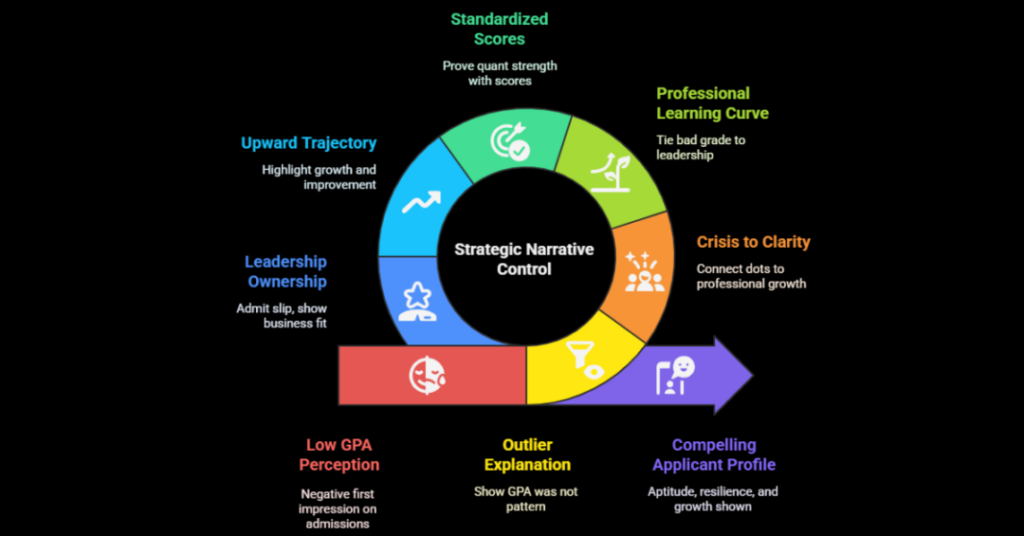1 July 2025
6 minutes read
How To Explain Low GPA In Personal Statement For MBA Application?

Key Takeaways
- Use how to explain low gpa in personal statement to show growth and self-awareness
- Highlight your GRE scores, work experience, and final-year improvements to offset low GPA
- Tailor your MBA application to fit the class profile and expectations of your target schools
More than 35% of MBA applicants have a GPA below 3.0—and no, it’s not the end of the road. Let’s be real: admissions committees aren’t looking for perfection; they’re looking for potential. If your grades dipped because of something real—family emergencies, health issues, switching majors, or plain immaturity—own it. In your personal statement, don’t sugarcoat it or go defensive.
Instead, explain your low GPA with clarity, take responsibility, and shift focus to your growth, work experience, or stellar GMAT/GRE scores. That’s how you turn a red flag into a green light in your MBA application.
6 Unique Ways To Explain Low GPA In Personal Statement
The admissions committee can see it the moment they scan your transcript. It’s like showing up to a business school interview wearing pajamas—you don’t need to explain low GPA, they already see it. But what you can do, is control the narrative. If you don’t address a low GPA in your personal statement or statement of purpose, you’re handing them a blank canvas to assume the worst. Instead, flip the script. Turn your poor grades into proof of aptitude, resilience, and post-GPA glow-ups.

Here’s how to do it like a pro—not like every other school applicant hiding behind clichés.
1. Show Your GPA Was an Outlier, Not the Pattern
If your low grades happened in just a few semesters—or even just in your major subjects—own it, then zoom out. Use your personal statement to contrast that phase with your overall academic performance, GRE/GMAT score, or final-year comeback. For grad school and MBA applications, this proves maturity, not mediocrity. Say: “This wasn’t a trend; it was a detour.”
2. Connect the Dots: From Crisis to Clarity
Maybe your lower grades stemmed from an illness, family crisis, or financial stress. That’s real life, not an excuse. The key is to extenuate, not complain. Explain your low GPA by focusing on how you handled it and what changed after. Show aptitude through what came next: stronger semesters, killer work experience, leadership roles. This builds your grad school case better than any sob story.
3. Tie It to a Professional Learning Curve
Had a bad grade because you were too busy learning to lead? Some MBA candidates tanked classes while launching startups, working full-time, or taking on real-world challenges. Use your statement of purpose to show how this made you job-ready, even if it tanked your academic performance. Your letter of recommendation can back this up. Smart graduate programs know real growth often happens outside lecture halls.
4. Prove Quant Strength Through Standardized Scores
If school applications raise eyebrows over your GPA, give them numbers they can’t argue with. A strong GRE quant score or GMAT percentile can crush doubts about your academic excellence. This is how you address a low GPA without a defensive tone. Think of it as academic damage control—and yes, it works wonders in the MBA application process.
5. Highlight Your Upward Trajectory
If your first years were rough but you crushed the final semesters, say it proudly. Explain a low GPA in the context of growth. That improvement proves you’re coachable—a trait business schools and graduate school programs love in an applicant. Bonus tip: pair this narrative with work experience that matches the growth curve.
6. Own It Like a Leader—Not a Victim
Here’s the deal: graduate school isn’t just looking for high GPAs. They’re looking for people who know how to learn, adapt, and rise. Use your SOP to admit the slip, explain it maturely, and then drive home your fit for business school—with stories, not stats. Most school applicants dodge the topic. You? You address it head-on—and get accepted because of it.
10 Top Business Schools That Accept Low GPA For MBA
Now the thing is that your low GPA in personal statement won’t magically vanish just because you avoid the topic. Admission committee members read thousands of applications each year, and trust me, they notice. But here’s the deal: a not-so-stellar overall GPA doesn’t mean your graduate studies dream is over.

If you can explain what happened, take responsibility, and offset your low GPA with things like standardized tests like the GRE, strong grades in major subjects, or a well-crafted essay explaining low GPA, you’re still in the game. Here are 10 universities that accept low GPA for MBA:
| Business School | Average GPA Score | Average Tuition Fees (per year) | Average Salary (Post-MBA) |
|---|---|---|---|
| Stanford GSB | 3.4 | $76,950 | $198,000 |
| Yale SOM | 3.3 | $79,000 | $165,000 |
| Chicago Booth | 3.4 | $77,841 | $180,000 |
| Northwestern Kellogg | 3.4 | $78,276 | $170,000 |
| Michigan Ross | 3.3 | $74,500 | $162,000 |
| NYU Stern | 3.3 | $76,780 | $155,000 |
| USC Marshall | 3.2 | $66,640 | $150,000 |
| Boston University Questrom | 3.2 | $59,050 | $140,000 |
| Indiana Kelley | 3.3 | $54,318 | $132,000 |
| Rice University (Jones) | 3.3 | $64,000 | $142,000 |
How To Improve Your MBA Application?
The admission committee members read thousands of applications each year, and they’re looking for more than just a competitive GPA and a polished LinkedIn. If your undergrad was a mess, your GPA score looks more like your Uber rating, and you’re dealing with poor academic performance or a parents’ divorce during your year of college—then guess what? You still have a shot. But only if you play it smart.
Here’s how to improve your MBA application like someone who understands how to win, not just apply.
1. Use the Personal Statement to Do What Your GPA Couldn’t
Your low GPA in your application doesn’t have to be a deal-breaker—unless you pretend it never happened. Writing a personal statement gives you the power to explain low GPA in personal terms. Don’t hide it. Address your low GPA, explain what happened, and talk about what you learned. Whether it was personal health, financial issues, or study and work overload, go ahead and clarify. Bonus points if you justify your low with clear outcomes—think better grades in major subjects, standardized tests like the GRE, or leadership experiences.
2. Reference Letters > GPA
Your reference letter can quietly fix what your overall GPA screams. A strong recommender—one who can highlight your academic abilities and growth beyond your undergraduate gpas—is gold. If you had ds throughout your academic career but crushed it at work or in a side project, ask your recommender to back that up. This is a way to demonstrate that you’re more than just numbers. Admissions officers want proof you’re ready for graduate studies—not just excuses for low GPA in personal statement.
3. Tweak Your MBA Essay Questions to Show Strategy
Every top business school wants evidence of clarity, ambition, and resilience. That’s why your answers to MBA essay questions matter. This is your space to briefly mention the lowlights—like a bad semester, a rough year of college, or even a parents’ divorce—but shift the spotlight to what followed: promotions, side hustles, extra classes, or crushing it on the GRE or GMAT. A smart, strategic essay makes you look like the perfect candidate even with a low GPA in your application.
4. Nail the MBA Interview Like a Comeback Story
If you’ve made it to the MBA interview, the school’s interested. Now, your job is to reinforce their belief. Be honest but sharp when they bring up your average GPA or academic performance. Take responsibility, explain your low grades without dragging it out, and move on to what really matters—what you’ve done since then. Highlight how you performed well on the GRE, how you upskilled post-undergrad, or how your class profiles now reflect someone who belongs at Yale SOM or Michigan Ross.
5. Reverse Engineer the School’s Incoming Class
You want into Northwestern Kellogg? Cool. Then study the class profiles. Check out the incoming class stats—average GPA, GRE/GMAT scores, career paths—and map your story accordingly. If your undergraduate GPA is a bit off, balance it with a killer sample personal statement, a strong quant score, or proof of performance in your post-college years. Understanding how you stack up against others will help you offset your low GPA while still aligning with what admissions committee members want.
Conclusion
If you’re aiming for a master’s program in business, a low GPA doesn’t shut the door—it just means you’ll need to push it open differently. The goal isn’t to hide your weaknesses but to show how you’ve moved past them. Take ownership, explain clearly, and bring evidence of who you’ve become since that number on your transcript. Admissions committees aren’t only investing in your past; they’re betting on your future. Show them it’s a good one.
Most applicants struggle to write a perfect personal statement but end up sounding arrogant — but you won’t. At Ambitio, our AI-powered study abroad experts help you craft a powerful, standout statement that gets noticed. No fluff, no clichés—just a compelling story that proves you belong. Schedule a call with Ambitio’s experts.
FAQs
Why should I explain a low GPA in my personal statement?
Explaining a low GPA helps admissions committees understand the context behind your grades and shows your self-awareness and growth.
Should I focus on excuses or solutions when explaining my low GPA?
Focus on solutions, what you learned, and how you improved rather than making excuses.
How honest should I be about the reasons for my low GPA?
Be honest but professional; briefly mention challenges without oversharing personal details.
Can I mention external factors like illness or family issues?
Yes, if relevant and it impacted your academic performance, but keep it concise and focus on how you overcame them.
How do I show improvement after a low GPA?
Highlight upward trends in your grades, better performance in relevant courses, or additional academic achievements.
Should I apologize for my low GPA?
No need to apologize; instead, acknowledge it and emphasize your commitment to academic success.
How long should the explanation be?
Keep it brief—usually 1-2 sentences within your personal statement.

You can study at top universities worldwide!
Get expert tips and tricks to get into top universities with a free expert session.
Book Your Free 30-Minute Session Now! Book a call now




























